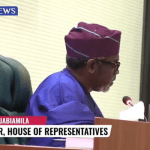The Business Facilitation Law recently signed by President Muhammadu Buhari is a result of the Executive order 001 2017.
Lawyer and manager with PriceWaterhouseCooppers, Emmanuel Akpeme disclosed this while speaking to Tolulope Ogunjobi, on Business Nigeria on TVC News on Tuesday Morning.
The law according to him was enacted to ensure that the gains inherent in the Executive Order 001 2017 are protected and enshrined in the nations’ laws.
He disclosed that the Executive order which gave birth to the Presidential Enabling Business Environment Council, PEBEC, had limited impact because it was not a law but an order which can be effectively refused and even lifted in Court.
He said the law will ensure that Levies, Licenses, permits and Others are easily accessible to those who want it through the Presidential Enabling Business Environment Council which is now backed by law in the Business Facilitation Law 2023.
He added that the law will serve as a platform for the easing of business dealings in Nigeria by local and Foreign investors.
The new law according to him is divided into 11 sections with Section 9 making provision for the consequential amendment of Laws like CAMA, Financial Reporting Council of Nigeria and Others.
Mr Akpeme said the important parts of the new law are 3 with the first being the simplification of application processes for permits, licenses and Others with the requirements made public according to the law.
The Second provision is the provision for the default approval of permits, licenses and Others if the agency of Government fails to approve or reject it within the stipulated period.
Gong further he said the issue of consequential amendments of laws due to the signing of the Business Facilitation Act into law are the CAMA with the provision for virtual annual general meeting for both public and private companies.
Others according to him is the approval of electronic voting which is now a law.
On whether the Business Facilitation Act can achieve its stated objective Mr Akpeme said the Ministries, Department and Agencies need to improve their processes especially with the introduction of Technology to ensure the reduction of the Human interface for the approval of permits, licenses and Others.
He however said the law also has its own ambiguities which need to be addressed.
He called for an automation of the default approval process so that it will no longer have to go through some processes that reduces its impact.
He described the newly signed Business Facilitation Act as a major platform that will aid the nations’ climb up the ladder on the Ease of doing Business chart from 131 to a better place that will aid Investment.
He said the implementation needs to be sustained and also improved upon so that the gains can be sustained.













